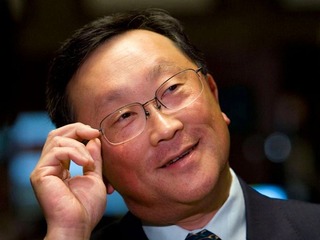Oxford Cancer Analytics raises $11M to detect lung cancer via a blood test
OXcan combines proteomics and artificial intelligence for early detection
Read more...
After a long, sad slide over the past few years, things are finally starting to turn around at BlackBerry. Kind of, sort of. Things are good enough, at least, that no one else is going to be fired. So there's that.
An internal memo from CEO John Chen, which was sent out to employees, and obtained by Reuters, stated that BlackBerry's three yearlong restructuring process is finally at an end.
In fact, it seems like BlackBerry is now finding itself in the strange position of actually having to add people!
"We have completed the restructuring notification process, and the workforce reduction that began three years ago is now behind us," Chen wrote. "More importantly, barring any unexpected downturns in the market, we will be adding headcount in certain areas such as product development, sales and customer service, beginning in modest numbers."
After losing its position as the top smartphone manufacturer to Apple and Samsung, BlackBerry was forced to cut roughly 60% of its workforce in three years, going from over 17,500 in 2011 to just 7,000 employees.
That included cut 5,000 employees in 2012, and even more in 2013. In July, BlackBerry laid off 250 employees in new product testing and R&D, and in August it got rid of another 100 jobs at its Waterloo, Ontario headquarters.
In the most devastating cut, BlackBerry slashed 40% of its total workforce, or 4,500 employees, in September of last year.
The restructuring also lead to an executive purge; not only did long-time CEO Thorsten Heins resign his position, but numerous others were forced out, including VP of Strategic Alliances Chris Wormland, EVP of Global Sales and Regional Marketing Rick Costanzo, Chief Operating Officer Kristian Tear, Chief Marketing Officer Frank Boulben, and Chief Financial Officer Brian Bidulka.
Since taking over in November, Chen has done an impressive job helping to right the ship by making the company leaner and more efficient: that involved cutting jobs, but also selling off assets and making strategic partnerships.
In January, the company was chosen by the Department of Defense to be the primary device for a new mobile program, adding 100,000 users.
It has also looked to build in area outside of smartphone manufacturing, including data security. Just last week the company purchased Secusmart GmbH, a high-security voice and data encryption and anti-eavesdropping solutions for government organizations, enterprises and telecommunications service providers.
Things are going well enough to BlackBerry now, in fact, that Chen wrote in the memo that be believes that the company will be cash flow positive by the end of this year.
Chen's turn-around of BlackBerry has also helped its stock as well. When Chen took over, the stock was trading at $6.50 a share. Eight months later, it has gone up 45%. The stock is currently trading at $.947 a share, up 32 cents, or 3.5% in trading on Tuesday.
BlackBerry still has a long way to go before it can reclaim its former glory, but being in a place where cutting it no longer necessary, and there is a clear path to the future, is a very good for its long-term prospects. If you had told me last year that BlackBerry would be doing this well so quickly, I probably would not have believed you.
A BlackBerry spokesperson has confirmed the authenticity of the Reuters report to VatorNews.
(Image source: commons.wikimedia.org)
OXcan combines proteomics and artificial intelligence for early detection
Read more...Nearly $265B in claims are denied every year because of the way they're coded
Read more...Most expect to see revenue rise, while also embracing technologies like generative AI
Read more...


